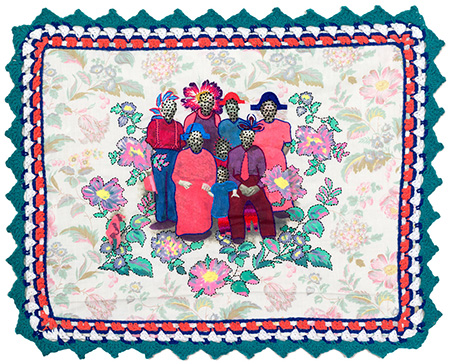
Continuing through May 9, 2019
The gallery at Chicago Artists’ Coalition is occupied by the work of three artists, divided into three sections. Curator Elliot J. Reichert presents “The Body is Work,” featuring Hale Ekinci, Shir Ende and Mayumi Lake, within the theme of artists as “specific bodies” --a take on Donald Judd’s idea of a “specific object.” If “specific objects” are Amongst these three very different bodies of work, this complexity is what they have in common --a layering of different processes to create works that defy categorization.
Mayumi Lake’s installation, “Unison (Elicitors)” spans two walls, a low relief collage of pigment prints of flowers scanned from kimono fabric patterns, arranged circularly, like hurricane clouds as seen from above. The vivid printed petals are punctuated by glossy plastic petals and shimmering metallic fronds. Appropriation, digital reproduction and reduplication, collage and assemblage, site specific installation, autobiography and formalism: looking at this single work of Lake’s, viewers are able to appreciate the multiple transformations that took place within its making. Like Lake’s, Shir Ende’s digital prints are multilayered. In several of these small, framed pieces, bodies are photographed leaning over waist-high, freestanding walls, ducking behind minimal, shoulder-height structures. Several are photographs of photographs, folded and cut or overlaid with grids and geometric line drawings; others look like scans of simple cut paper collages that formally mirror the constructions in the photographs. Together, Ende’s works manipulate our perceptions of architecture, confusing scale with each layer of process.
Hale Ekinci’s works, which occupy the majority of the exhibition’s real estate, are the most forthcoming in the evidence of their making. On bedsheets stretched like canvas, framed with crocheted Turkish lace patterns, black-and-white photo transfers of the artist’s family are applied amongst the floral patterns of the fabric. Parts of the sheet’s patterns are made more vibrant with layers of paint, effectively merging the background with the foreground, and the figures’ faces and clothes are painted or dotted with embroidered French knots. Three works suspended from the ceiling are composed of the same materials, but wound around a hoop like a shower curtain, draped over wooden armature like a peaked roof, and hanging from a horizontal dowel, the viewer is further privy to their making. Peering between the part in the “curtain” of “Fitting, Room” or sticking one’s head beneath “New House,” one can see the stains of the photo transfer and paint mingle with a disorderly trail of stitches on the sheets’ reverse.
Seeing the backside of these works not only exposes the order of her physical processes, but underscores the works’ narrative content. The use of the bed sheets, the reproduction of family photos, the incorporation of the laboriously crafted lace reveal intimacy; the paint and embroidery negate the specificity of individual identities through an additive process. For Ekinci, Ende and Lake, more is more, and their multiple processes are more than just a means to an end. In “The Body is Work,” a viewer can come to the conclusion that clarity and truth are not always the same thing, that obscurity, confusion and chaos can often feel much closer to reality.
